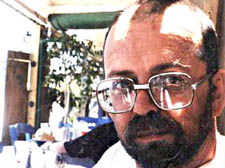|
|
 |
| |

Phil Jeffries |
Those of us fighting for a just world have lost a valuable ally.
MANY people will know Phil Jeffries as a committed campaigner for the King’s Cross community.
Phil – who died of cancer on December 14, age 55 – was a founding member of the King’s Cross Railway Lands Group in 1987, and served as chairman on three separate occasions during its 21 years.
His particular skill was for parliamentary and paralegal work, leading the case against the original Channel Tunnel Rail Link (CTRL), which would have demolished large swathes of King’s Cross.
Later, when the route changed to St Pancras in 1993, he helped found the Cally Rail Group, not to campaign against the rail link but to ensure it disrupted the local community as little as possible.
Phil’s knowledge of construction impacts was put to good use when CTRL wanted round-the-clock work on the refurbishment of St Pancras station.
He worked with local people to convince Camden Council to oppose the application and then helped prepare evidence for the resulting planning inquiry.
The Planning Inspector rejected CTRL’s appeal in February 2004, and when regular meetings were set up between CTRL, Camden officers and residents to agree construction methods, Phil continued to advise.
In 2004, Cally Rail Group widened its brief to campaign for a better development on the King’s Cross Railway Lands. We had welcomed CTRL in principle because we hoped for real regeneration that would benefit local people. As part of the King’s Cross Think Again campaign, Phil was at the forefront in preparing the unsuccessful case for judicial review against Camden’s acceptance of the inadequate Argent scheme.
Earlier this year, after Islington rejected the scheme for the Triangle site and Argent appealed, Phil acted at the planning inquiry as advocate for Cally Rail and KX Railway Lands groups, arguing to have environmental problems on the site taken seriously and for more affordable housing.
He helped set up King’s Cross Voices, our local oral history project. When its parent organisation, King’s Cross Community Development Project, went bankrupt because of mismanagement, Phil worked tirelessly to rescue the project, support the staff and secure its future with Camden Council.
Phil was born in Darlington in 1953 and came to London to study physiology. He did not finish his degree but became involved in the squatting movement, which is how I met him in 1976.
He was active for many years in the peace movement, helping to found the Peace Movement Legal Support Group, which advised activists on the law and supported those arrested while protesting.
Phil held various jobs until, in 1985, as a result of his work in the Nuclear-Free Zones Movement, he went to work for the Greater London Council.
After abolition he became PA to the Labour leader of the Fire and Civil Defence Authority, and in recent years he was the London Fire Brigade’s statistician. This year he and two colleagues won a special award for their work tracking down someone who made 885 hoax calls in 45 days: by analysing the pattern of calls from various public call boxes Phil predicted which the hoaxer would use next, leading to his arrest.
Phil was a trade unionist and (sometimes critical) Labour Party member. Alongside other political and community campaigns too numerous to list, he loved cooking, music, birdwatching and history. Until the illness overtook him he struggled to continue research on a history project which engaged him for many years.
Phil was diagnosed with lung cancer, with brain secondaries, on August Bank Holiday this year. He faced the knowledge that he would die with courage and grace: “Don’t talk statistics to a statistician,” he said. “I may live another 20 years.” Despite palliative treatment, the disease progressed shockingly fast. Staff in St Joseph’s Hospice in Hackney, where he went on December 5, did everything they could for him.
Phil’s final act, as a scientist dedicated to improving life for everyone, was to leave his body to the London teaching hospitals. This means there will be no funeral, but details of an event to celebrate his life will announced, when available.
The struggle for a just and peaceful world continues, but without one of its most dedicated campaigners.
DIANA SHELLEY
Diana Shelley is chairwoman of the Cally Rail Group |
 |
|
|
 |
Your comments:
I KNEW Phil while working for the London Wildlife Trust at Camley Streeet Natural Park which in the original BR plans would have been obliterated. It was due to the hard work and commtiment of Phil and other leading lights of the KXRLG that the Park was saved, and with it the subsequent opportunity for thousands of children to be able to enjoy and learn from a tiny green space in the midst of the mahem that was the CTRL development. Following this initial victory came the arduous and often incomprehensible task of protecting the Park's interests in the face of massive disruption, when Phil was ever present to give advice and act as an ambassador for Camley Street whenever the opportunity arrived. I always marvelled at Phil's quick thinking and analytical skills as well as his energetic approach to issues of injustice and I know that his loss will be keenly felt among local people battling to restore compassion, humanity and justice in an area which often seemed besieged by unscupulous outside interests. Although he would have been the last to acknowledge it, Phil was a true inspiration to us all.
A. Littlewood
|
| |
|
 |
|

